外研版英语八年级下册Module 3 Journey to space 知识点讲解课件(共38张PPT)
文档属性
| 名称 | 外研版英语八年级下册Module 3 Journey to space 知识点讲解课件(共38张PPT) | 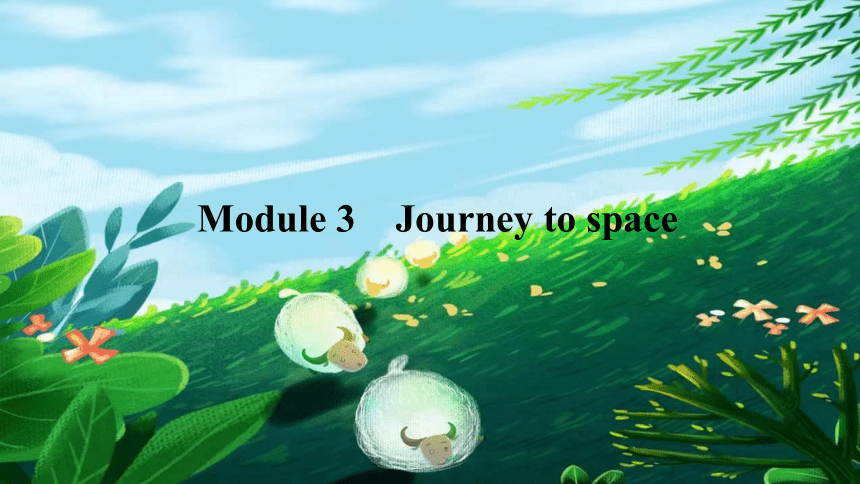 | |
| 格式 | pptx | ||
| 文件大小 | 287.9KB | ||
| 资源类型 | 教案 | ||
| 版本资源 | 外研版 | ||
| 科目 | 英语 | ||
| 更新时间 | 2022-04-17 12:08:48 | ||
图片预览

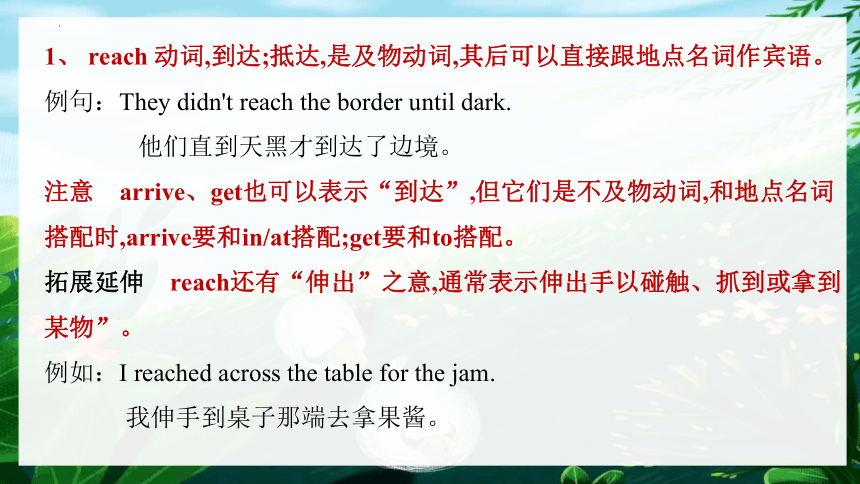
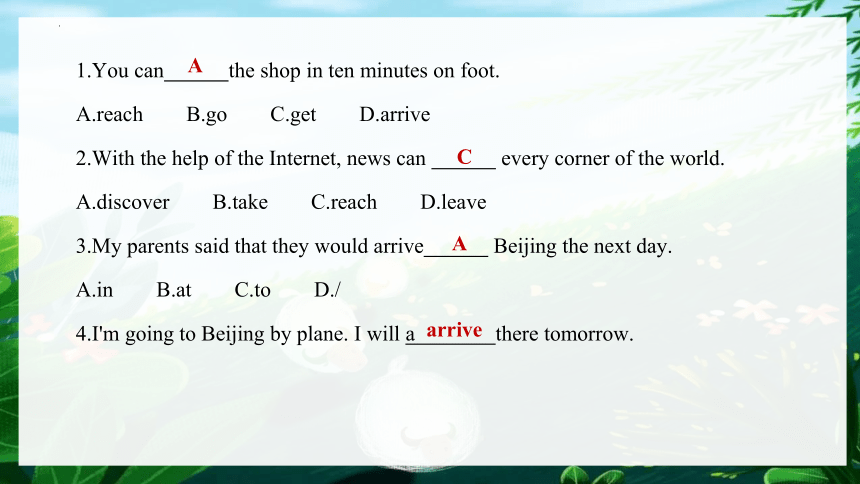
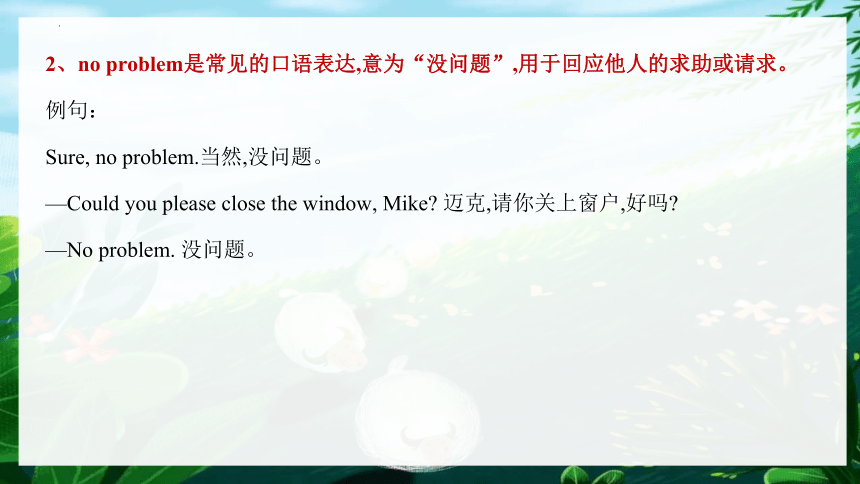
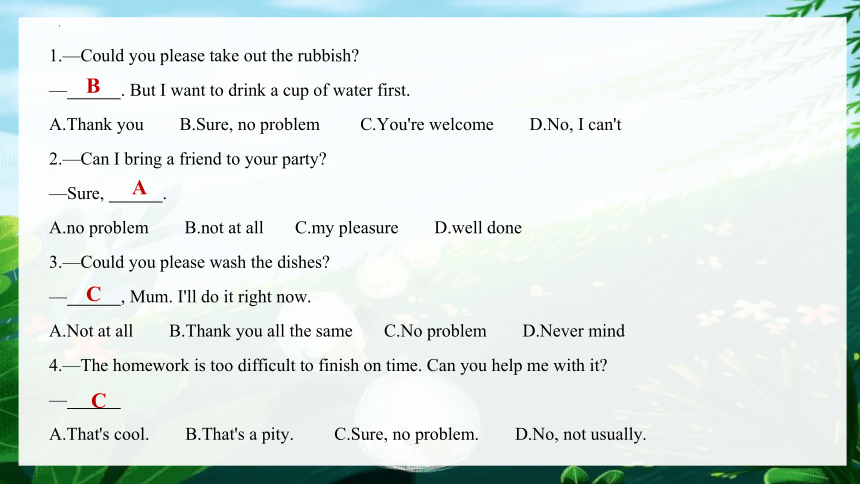
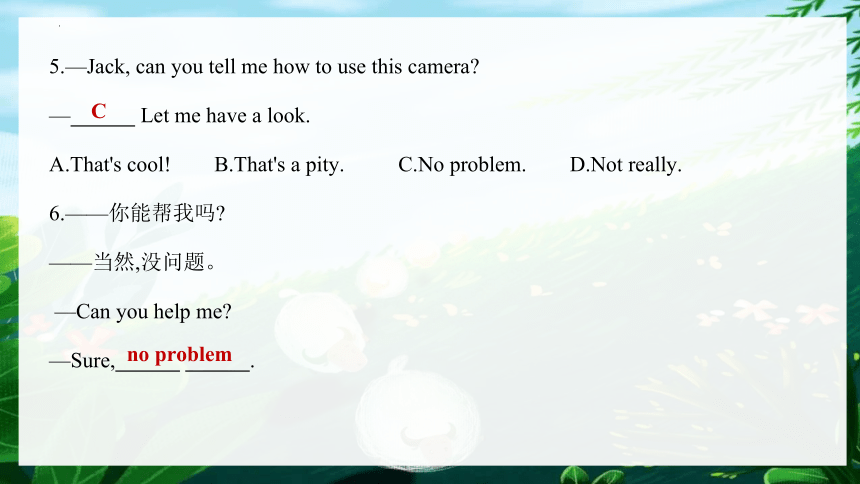
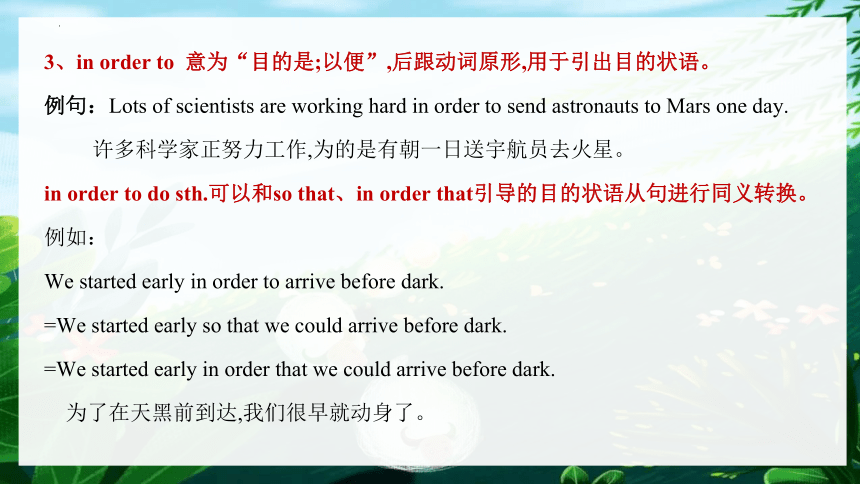
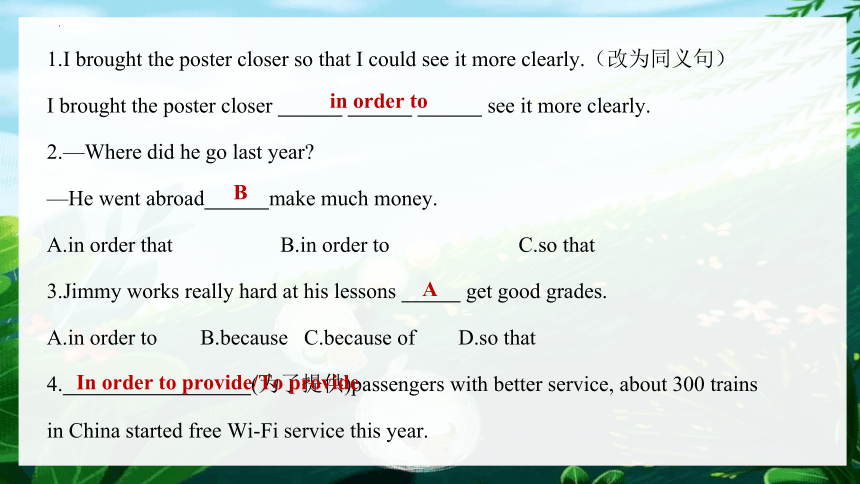
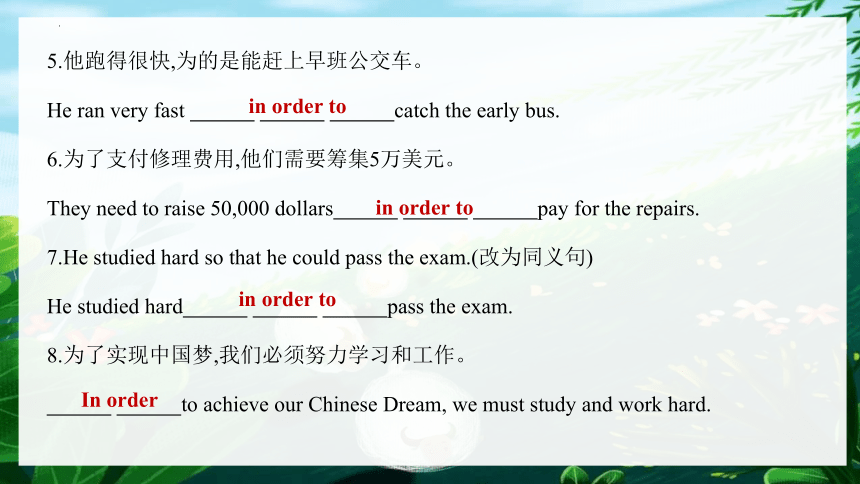
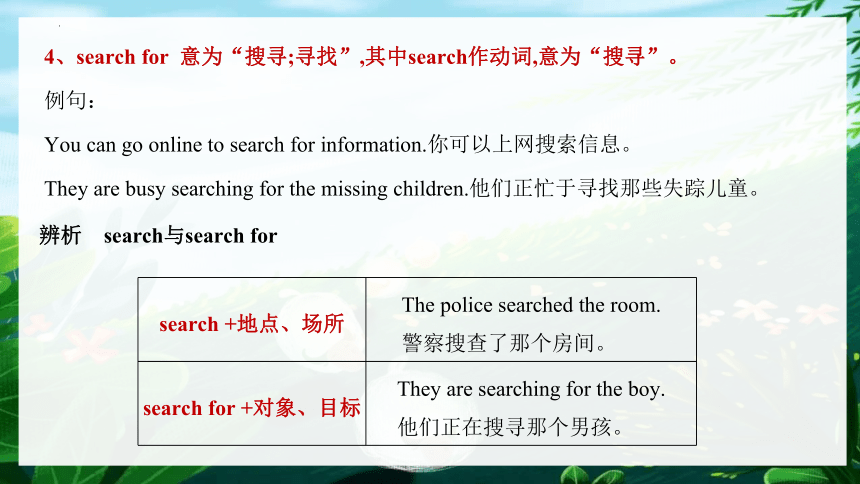
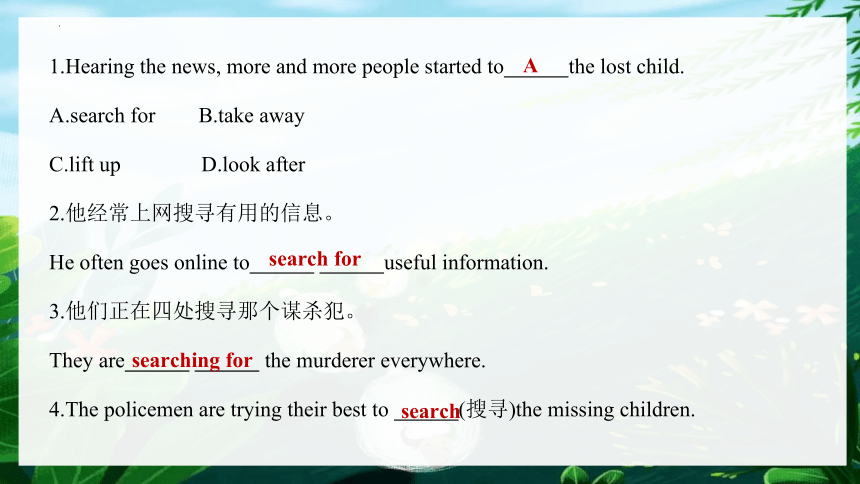
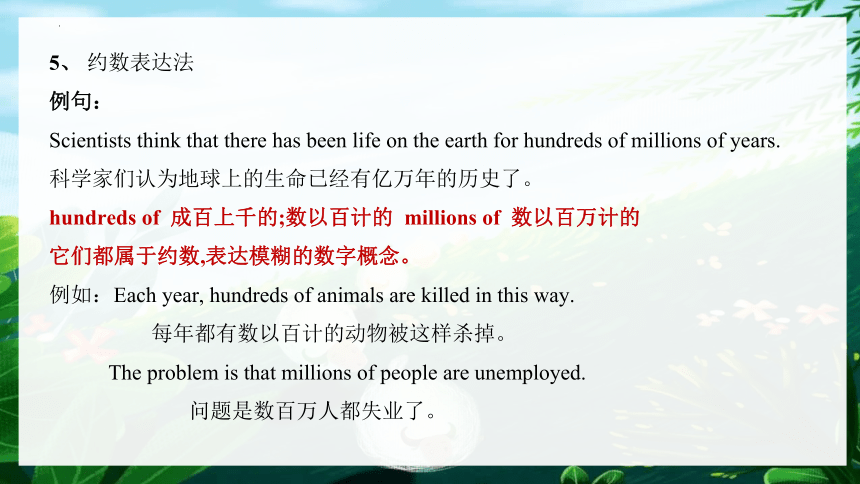
文档简介
(共38张PPT)
Module 3 Journey to space
1、 reach 动词,到达;抵达,是及物动词,其后可以直接跟地点名词作宾语。
例句:They didn't reach the border until dark.
他们直到天黑才到达了边境。
注意 arrive、get也可以表示“到达”,但它们是不及物动词,和地点名词搭配时,arrive要和in/at搭配;get要和to搭配。
拓展延伸 reach还有“伸出”之意,通常表示伸出手以碰触、抓到或拿到
某物”。
例如:I reached across the table for the jam.
我伸手到桌子那端去拿果酱。
1.You can the shop in ten minutes on foot.
A.reach B.go C.get D.arrive
2.With the help of the Internet, news can every corner of the world.
A.discover B.take C.reach D.leave
3.My parents said that they would arrive Beijing the next day.
A.in B.at C.to D./
4.I'm going to Beijing by plane. I will a there tomorrow.
A
C
A
arrive
2、no problem是常见的口语表达,意为“没问题”,用于回应他人的求助或请求。
例句:
Sure, no problem.当然,没问题。
—Could you please close the window, Mike 迈克,请你关上窗户,好吗
—No problem. 没问题。
1.—Could you please take out the rubbish
— . But I want to drink a cup of water first.
A.Thank you B.Sure, no problem C.You're welcome D.No, I can't
2.—Can I bring a friend to your party
—Sure, .
A.no problem B.not at all C.my pleasure D.well done
3.—Could you please wash the dishes
— , Mum. I'll do it right now.
A.Not at all B.Thank you all the same C.No problem D.Never mind
4.—The homework is too difficult to finish on time. Can you help me with it
—
A.That's cool. B.That's a pity. C.Sure, no problem. D.No, not usually.
B
A
C
C
5.—Jack, can you tell me how to use this camera
— Let me have a look.
A.That's cool! B.That's a pity. C.No problem. D.Not really.
6.——你能帮我吗
——当然,没问题。
—Can you help me
—Sure, .
C
no problem
3、in order to 意为“目的是;以便”,后跟动词原形,用于引出目的状语。
例句:Lots of scientists are working hard in order to send astronauts to Mars one day.
许多科学家正努力工作,为的是有朝一日送宇航员去火星。
in order to do sth.可以和so that、in order that引导的目的状语从句进行同义转换。
例如:
We started early in order to arrive before dark.
=We started early so that we could arrive before dark.
=We started early in order that we could arrive before dark.
为了在天黑前到达,我们很早就动身了。
1.I brought the poster closer so that I could see it more clearly.(改为同义句)
I brought the poster closer see it more clearly.
2.—Where did he go last year
—He went abroad make much money.
A.in order that B.in order to C.so that
3.Jimmy works really hard at his lessons get good grades.
A.in order to B.because C.because of D.so that
4. (为了提供)passengers with better service, about 300 trains
in China started free Wi-Fi service this year.
in order to
B
A
In order to provide/To provide
5.他跑得很快,为的是能赶上早班公交车。
He ran very fast catch the early bus.
6.为了支付修理费用,他们需要筹集5万美元。
They need to raise 50,000 dollars pay for the repairs.
7.He studied hard so that he could pass the exam.(改为同义句)
He studied hard pass the exam.
8.为了实现中国梦,我们必须努力学习和工作。
to achieve our Chinese Dream, we must study and work hard.
in order to
in order to
in order to
In order
4、search for 意为“搜寻;寻找”,其中search作动词,意为“搜寻”。
例句:
You can go online to search for information.你可以上网搜索信息。
They are busy searching for the missing children.他们正忙于寻找那些失踪儿童。
辨析 search与search for
search +地点、场所 The police searched the room.
警察搜查了那个房间。
search for +对象、目标 They are searching for the boy.
他们正在搜寻那个男孩。
1.Hearing the news, more and more people started to the lost child.
A.search for B.take away
C.lift up D.look after
2.他经常上网搜寻有用的信息。
He often goes online to useful information.
3.他们正在四处搜寻那个谋杀犯。
They are the murderer everywhere.
4.The policemen are trying their best to (搜寻)the missing children.
A
search for
searching for
search
5、 约数表达法
例句:
Scientists think that there has been life on the earth for hundreds of millions of years.
科学家们认为地球上的生命已经有亿万年的历史了。
hundreds of 成百上千的;数以百计的 millions of 数以百万计的
它们都属于约数,表达模糊的数字概念。
例如:Each year, hundreds of animals are killed in this way.
每年都有数以百计的动物被这样杀掉。
The problem is that millions of people are unemployed.
问题是数百万人都失业了。
拓展延伸 thousand、billion也有这样的搭配。
thousands of 成千上万的;数以千计的
billions of 数十亿的
例如:
Thousands of people went to see them off at the station.
成千上万的人去车站给他们送行了。
温馨提示
This fossil may be over two million years old.
这块化石可能超过两百万年了。
1.Do you know that the earth is home to animals
A.million B.millions C.million of D.millions of
2.The ice and snow in Harbin is beautiful, so every winter tourists come here.
A.two million of B.millions of C.million of
3. birds have come back because the environment here becomes better and better.
A.Thousands of B.Thousand of C.Thousands
4.The CCTV program The Reader interests people of all ages.
A.thousand B.thousands C.thousand of D.thousands of
5.We gave away books to the school library last year.
A.six thousands B.six thousand C.six thousands of D.six thousand of
D
B
A
D
B
6. people visited Hongyadong, Chongqing on May Day this year.
A.Thousand B.Thousand of C.Thousands D.Thousands of
7.广场上有数千名游客。
There are visitors at the square.
8.—“Food Safety”has become one of the hottest topics recently.
—Yeah, it receives Internet hits a day.
A.thousands B.thousands of C.thousand D.hundreds
9. volunteers will be needed for the 2020 Beijing Winter Olympic Games.
A.Two thousand of B.Two thousands of C.Thousand of D.Thousands of
D
thousands of
B
D
6、一般现在时的被动语态
例句:The sun and its planets are called the solar system...
太阳和它的行星被称为太阳系……
are called是一般现在时的被动语态,表示“被称为”。
一般现在时的被动语态的结构是“am/is/are+过去分词”。
例如:The flowers are watered by my grandfather every day.
我爷爷每天都浇花。
1.People drink Chinese tea all over the world.(改为被动语态)
Chinese tea all over the world.
2.Look at the picture. The top five TV plays in it.
A.list B.are listed C.will list D.will be listed
3.Around the world, 300 million tons of plastic each year, of which about 10 percent ends up in the sea.
A.is created B.was created C.creates
4.Our classroom by students every afternoon.
A.is cleaned B.was cleaned C.Cleans
5.We call the village Xucun.(改为被动语态)
The village Xucun by us.
is drunk
B
A
A
is called
6.A baby's first month birthday is a special event in China and with a special party.
A.is celebrated B.is celebrating C.was celebrated D.celebrates
7.The environment in my hometown is improving because many trees every year.
A.plant B.planted C.are planted
8.这座楼是以这位英雄的名字来命名的。
The building the hero.
9.那颗行星被称为火星。
The planet Mars.
A
C
is named after
is called/named
7、 impossible 形容词,意为“不可能的”,
它是由possible加否定前缀构成的派生词。
例句:
It is impossible to imagine.
这是不可能想象到的。
It's impossible to get everybody together at the same time.
让所有人同时聚在一起是不可能的。
1.永远不要许诺做你无法做到的不可能的事情。
Never promise things you can't do.
2.It is (possible)for humans to live on Mars now.
3.Nothing is (不可能的) if we work hard.
4.—English is too difficult. I don't think I can learn it well.
—Nothing is if you put your heart into it.
A.impossible B.important C.interesting D.comfortable
5.It's i to finish the project in such a short time.
6.No kidding. It's (不可能的)to do this in a week.
to do impossible
impossible
impossible
A
impossible
impossible
8、communicate with sb. 表示“和某人交流/沟通”,
其中communicate作动词,意为“交流;沟通”。
例句: Why has no one communicated with us
为什么还没有人和我们联系呢
Parents often find it difficult to communicate with their children.
父母常会发现跟他们的孩子沟通很难。
拓展延伸 派生词:communication n. 交流;沟通
例如:Communication between the old and the young is not so difficult as you think.
老年人和年轻人之间的交流没有你想的那样困难。
1.I like to (交流) with my family when I have free time.
2.Now (communicate)between people is very quick and simple thanks to the mobile phone.
3.许多父母都不知道如何和他们的孩子交流。
Lots of parents don't know how to their children.
4.Mary will (交流)with me by email.
5.Parents find it hard to (交流)with their children.
6.Usually, the mother spends half an hour c with the father about their son's study.
7.Nowadays, people are used to communicating each other through WeChat or QQ.
A.of B.with C.to D.over
communicate
communication
communicate with
communicate
communicate
communicating
B
9、现在完成时(2)
本模块的语法知识还是现在完成时,不过本模块侧重讲现在完成时的标志
词以及该时态和一般过去时的区别。
(1)以already、just或yet为标志
already、just或yet 分别表示到现在为止动作或状态已经、刚刚或还没有发生。
He has already got her help.他已经得到了她的帮助。
He has just seen the film.他刚刚看过这场电影。
He hasn't come back yet.他还没有回来。
(2)以ever或never为标志
ever和never分别表示到现在为止动作或状态曾经或从来没有发生过。
This is the best film I have ever seen.
这是我曾经看过的最好的一部电影。
He has never been to Beijing.
他从来没有去过北京。
(3)现在完成时与一般过去时的区别
两种时态除结构、句式和相搭配的时间状语都不同之外,最重要的就是意义不同。虽然都发生在过去,但现在完成时强调的是过去的动作对现在的影响,而一般过去时与现在没有任何关系,只是描述一个发生在过去的事实而已。
试比较:
I have seen the film.我看过这部电影。
(对现在的影响是我了解这部电影的内容)
I saw the film last week.我上星期看了这部电影。
(只说明上星期看了这部电影,不涉及现在的情况)
1.—Have you your homework, Tom
—Yes, Mum. I it an hour ago.
A.finish;finished B.finished;finished
C.finished;have finished D.finish;finish
2.我刚给我妈妈打过电话了。
I my mother.
3.We (learn)about two thousand English words so far.
4.—Have you visited New York
—Yes, I have. I there twice.
A.have gone B.have been C.will go D.went
B
have just called
have learned
B
5.我已经给他发过电子邮件了。
I him an email.
6.到目前为止你完成工作了吗
Have you finished the work
7.—Has Tony watched the TV show (作肯定回答)
—Yes, .
8.—Have your friends left yet (作否定回答)
—No, .
have already sent
so far
he has
they haven't
9.We haven't (hear) the latest news yet. Could you tell us more about it
10.Sarah many places of interest in Beijing already.
A.visited B.has visited C.will visit D.visits
11.— you the model of the house yet
—Yes, I have. I finished it last night.
A.Did;make B.Have;made C.Will;make D.Do;make
12.他们从来没有去过火星。
They Mars.
heard
B
B
have never been to
13.萨莉现在不在教室,她去图书馆了。
Sally isn't in the classroom now. She .
14.宇航员已经去过火星了吗
astronauts Mars yet
15.我们还没有在火星上发现生命。
We life on Mars.
has gone to the library
Have been to
haven't discovered
10、辨析already与yet
I have already called the police.我已经报警了。
Have you finished your homework yet 你写完作业了吗
already 多用在现在完成时的肯定句中,常位于助动词之
后,行为动词之前,already也可以位于句尾
yet 多用在现在完成时的疑问句或否定句中,
常位于句尾
1.—Has it arrived
—Yes, it has arrived .
A.yet;yet B.already;yet C.already;already D.yet;already
2.A spaceship to Mars. It has not come back .
A.has gone;yet B.has been;already
C.has gone;already D.has been;yet
3.—Ken has finished his work.What about you
—Sorry, I haven't finished it .
A.already;already B.yet;already C.yet;yet D.already;yet
4.Has it arrived (还,尚)
D
A
D
yet
5.Tony hasn't started to make a model spaceship for his school project .
A.already B.yet C.just D.also
6.He's already finished his work.(改为否定句)
He finished his work .
7.He's already been back from work.(改为一般疑问句)
he been back from work
B
hasn't yet
Has yet
8.—Have you cleaned your room
—Yes, I have cleaned it.
A.already;already B.yet;yet C.already;yet D.yet;already
9.Have you read the novel y
10.Scientists have already started to discover the seas.(改为一般疑问句)
scientists started to discover the seas
11.They have already found out the truth.(改为一般疑问句)
found out the truth
D
yet
Have yet
Have they yet
all 表示“三者或三者以上的人或物都”,它的反义词是none
both 表示“两者都”,both可以和and搭配,表示“……和……都”。
当both...and...结构作主语时,谓语动词要用复数形式
either 表示“两者中的任何一个”,either可以和or搭配,表示“或者……或者……;要么……要么……”。either...or...结构作主语时,谓语动词要和or之后的主语部分保持一致,即遵循“就近原则”
neither 表示“两者都不”,neither可以和nor搭配,表示“……和……都不”
none 表示“三者或三者以上的人或物都不”。none可以和of连用
12.辨析all、both、either、neither与none
All of my friends like him.
我所有的朋友都喜欢他。
There are shops on both sides of the street.
街道两边都有商店。
Both Lisa and Mike are interested in pop music.
莉萨和迈克都对流行音乐感兴趣。
Neither of them felt like going back to sleep.
他俩都不想回去睡觉。
I invited some of my classmates to my party, but none of them accepted my invitation.
我邀请了我的一些同学来参加我的聚会,但是他们中没有一个人接受我的邀请。
1.—Do you like rock music or light music
— . I like pop music.
A.Both B.None C.Neither D.Either
2.—Do you like rock music or light music
— . I like Beijing Opera.
A.Either B.None C.Both D.Neither
3.They were all very tired, but of them had a rest.
A.either B.none C.both D.all
4.In the school, I asked one boy and two girls about the name of their headmaster,
but of them could help me.
A.neither B.none C.both D.all
C
D
B
B
5.—Which singer do you like, Zhang Liangying or Zhou Bichang
— . I love their songs very much.
A.All B.Neither C.Both
6.—Which fruit do you like best, apples, bananas or pears
— of them. Strawberries are my favorite.
A.Neither B.None C.All D.Either
7.I invited all my friends to my birthday party, but n of them agreed to come.
8.—Which do you prefer, juice or tea
— is OK. I don't care.
A.All B.Neither C.Either
C
B
C
none
Module 3 Journey to space
1、 reach 动词,到达;抵达,是及物动词,其后可以直接跟地点名词作宾语。
例句:They didn't reach the border until dark.
他们直到天黑才到达了边境。
注意 arrive、get也可以表示“到达”,但它们是不及物动词,和地点名词搭配时,arrive要和in/at搭配;get要和to搭配。
拓展延伸 reach还有“伸出”之意,通常表示伸出手以碰触、抓到或拿到
某物”。
例如:I reached across the table for the jam.
我伸手到桌子那端去拿果酱。
1.You can the shop in ten minutes on foot.
A.reach B.go C.get D.arrive
2.With the help of the Internet, news can every corner of the world.
A.discover B.take C.reach D.leave
3.My parents said that they would arrive Beijing the next day.
A.in B.at C.to D./
4.I'm going to Beijing by plane. I will a there tomorrow.
A
C
A
arrive
2、no problem是常见的口语表达,意为“没问题”,用于回应他人的求助或请求。
例句:
Sure, no problem.当然,没问题。
—Could you please close the window, Mike 迈克,请你关上窗户,好吗
—No problem. 没问题。
1.—Could you please take out the rubbish
— . But I want to drink a cup of water first.
A.Thank you B.Sure, no problem C.You're welcome D.No, I can't
2.—Can I bring a friend to your party
—Sure, .
A.no problem B.not at all C.my pleasure D.well done
3.—Could you please wash the dishes
— , Mum. I'll do it right now.
A.Not at all B.Thank you all the same C.No problem D.Never mind
4.—The homework is too difficult to finish on time. Can you help me with it
—
A.That's cool. B.That's a pity. C.Sure, no problem. D.No, not usually.
B
A
C
C
5.—Jack, can you tell me how to use this camera
— Let me have a look.
A.That's cool! B.That's a pity. C.No problem. D.Not really.
6.——你能帮我吗
——当然,没问题。
—Can you help me
—Sure, .
C
no problem
3、in order to 意为“目的是;以便”,后跟动词原形,用于引出目的状语。
例句:Lots of scientists are working hard in order to send astronauts to Mars one day.
许多科学家正努力工作,为的是有朝一日送宇航员去火星。
in order to do sth.可以和so that、in order that引导的目的状语从句进行同义转换。
例如:
We started early in order to arrive before dark.
=We started early so that we could arrive before dark.
=We started early in order that we could arrive before dark.
为了在天黑前到达,我们很早就动身了。
1.I brought the poster closer so that I could see it more clearly.(改为同义句)
I brought the poster closer see it more clearly.
2.—Where did he go last year
—He went abroad make much money.
A.in order that B.in order to C.so that
3.Jimmy works really hard at his lessons get good grades.
A.in order to B.because C.because of D.so that
4. (为了提供)passengers with better service, about 300 trains
in China started free Wi-Fi service this year.
in order to
B
A
In order to provide/To provide
5.他跑得很快,为的是能赶上早班公交车。
He ran very fast catch the early bus.
6.为了支付修理费用,他们需要筹集5万美元。
They need to raise 50,000 dollars pay for the repairs.
7.He studied hard so that he could pass the exam.(改为同义句)
He studied hard pass the exam.
8.为了实现中国梦,我们必须努力学习和工作。
to achieve our Chinese Dream, we must study and work hard.
in order to
in order to
in order to
In order
4、search for 意为“搜寻;寻找”,其中search作动词,意为“搜寻”。
例句:
You can go online to search for information.你可以上网搜索信息。
They are busy searching for the missing children.他们正忙于寻找那些失踪儿童。
辨析 search与search for
search +地点、场所 The police searched the room.
警察搜查了那个房间。
search for +对象、目标 They are searching for the boy.
他们正在搜寻那个男孩。
1.Hearing the news, more and more people started to the lost child.
A.search for B.take away
C.lift up D.look after
2.他经常上网搜寻有用的信息。
He often goes online to useful information.
3.他们正在四处搜寻那个谋杀犯。
They are the murderer everywhere.
4.The policemen are trying their best to (搜寻)the missing children.
A
search for
searching for
search
5、 约数表达法
例句:
Scientists think that there has been life on the earth for hundreds of millions of years.
科学家们认为地球上的生命已经有亿万年的历史了。
hundreds of 成百上千的;数以百计的 millions of 数以百万计的
它们都属于约数,表达模糊的数字概念。
例如:Each year, hundreds of animals are killed in this way.
每年都有数以百计的动物被这样杀掉。
The problem is that millions of people are unemployed.
问题是数百万人都失业了。
拓展延伸 thousand、billion也有这样的搭配。
thousands of 成千上万的;数以千计的
billions of 数十亿的
例如:
Thousands of people went to see them off at the station.
成千上万的人去车站给他们送行了。
温馨提示
This fossil may be over two million years old.
这块化石可能超过两百万年了。
1.Do you know that the earth is home to animals
A.million B.millions C.million of D.millions of
2.The ice and snow in Harbin is beautiful, so every winter tourists come here.
A.two million of B.millions of C.million of
3. birds have come back because the environment here becomes better and better.
A.Thousands of B.Thousand of C.Thousands
4.The CCTV program The Reader interests people of all ages.
A.thousand B.thousands C.thousand of D.thousands of
5.We gave away books to the school library last year.
A.six thousands B.six thousand C.six thousands of D.six thousand of
D
B
A
D
B
6. people visited Hongyadong, Chongqing on May Day this year.
A.Thousand B.Thousand of C.Thousands D.Thousands of
7.广场上有数千名游客。
There are visitors at the square.
8.—“Food Safety”has become one of the hottest topics recently.
—Yeah, it receives Internet hits a day.
A.thousands B.thousands of C.thousand D.hundreds
9. volunteers will be needed for the 2020 Beijing Winter Olympic Games.
A.Two thousand of B.Two thousands of C.Thousand of D.Thousands of
D
thousands of
B
D
6、一般现在时的被动语态
例句:The sun and its planets are called the solar system...
太阳和它的行星被称为太阳系……
are called是一般现在时的被动语态,表示“被称为”。
一般现在时的被动语态的结构是“am/is/are+过去分词”。
例如:The flowers are watered by my grandfather every day.
我爷爷每天都浇花。
1.People drink Chinese tea all over the world.(改为被动语态)
Chinese tea all over the world.
2.Look at the picture. The top five TV plays in it.
A.list B.are listed C.will list D.will be listed
3.Around the world, 300 million tons of plastic each year, of which about 10 percent ends up in the sea.
A.is created B.was created C.creates
4.Our classroom by students every afternoon.
A.is cleaned B.was cleaned C.Cleans
5.We call the village Xucun.(改为被动语态)
The village Xucun by us.
is drunk
B
A
A
is called
6.A baby's first month birthday is a special event in China and with a special party.
A.is celebrated B.is celebrating C.was celebrated D.celebrates
7.The environment in my hometown is improving because many trees every year.
A.plant B.planted C.are planted
8.这座楼是以这位英雄的名字来命名的。
The building the hero.
9.那颗行星被称为火星。
The planet Mars.
A
C
is named after
is called/named
7、 impossible 形容词,意为“不可能的”,
它是由possible加否定前缀构成的派生词。
例句:
It is impossible to imagine.
这是不可能想象到的。
It's impossible to get everybody together at the same time.
让所有人同时聚在一起是不可能的。
1.永远不要许诺做你无法做到的不可能的事情。
Never promise things you can't do.
2.It is (possible)for humans to live on Mars now.
3.Nothing is (不可能的) if we work hard.
4.—English is too difficult. I don't think I can learn it well.
—Nothing is if you put your heart into it.
A.impossible B.important C.interesting D.comfortable
5.It's i to finish the project in such a short time.
6.No kidding. It's (不可能的)to do this in a week.
to do impossible
impossible
impossible
A
impossible
impossible
8、communicate with sb. 表示“和某人交流/沟通”,
其中communicate作动词,意为“交流;沟通”。
例句: Why has no one communicated with us
为什么还没有人和我们联系呢
Parents often find it difficult to communicate with their children.
父母常会发现跟他们的孩子沟通很难。
拓展延伸 派生词:communication n. 交流;沟通
例如:Communication between the old and the young is not so difficult as you think.
老年人和年轻人之间的交流没有你想的那样困难。
1.I like to (交流) with my family when I have free time.
2.Now (communicate)between people is very quick and simple thanks to the mobile phone.
3.许多父母都不知道如何和他们的孩子交流。
Lots of parents don't know how to their children.
4.Mary will (交流)with me by email.
5.Parents find it hard to (交流)with their children.
6.Usually, the mother spends half an hour c with the father about their son's study.
7.Nowadays, people are used to communicating each other through WeChat or QQ.
A.of B.with C.to D.over
communicate
communication
communicate with
communicate
communicate
communicating
B
9、现在完成时(2)
本模块的语法知识还是现在完成时,不过本模块侧重讲现在完成时的标志
词以及该时态和一般过去时的区别。
(1)以already、just或yet为标志
already、just或yet 分别表示到现在为止动作或状态已经、刚刚或还没有发生。
He has already got her help.他已经得到了她的帮助。
He has just seen the film.他刚刚看过这场电影。
He hasn't come back yet.他还没有回来。
(2)以ever或never为标志
ever和never分别表示到现在为止动作或状态曾经或从来没有发生过。
This is the best film I have ever seen.
这是我曾经看过的最好的一部电影。
He has never been to Beijing.
他从来没有去过北京。
(3)现在完成时与一般过去时的区别
两种时态除结构、句式和相搭配的时间状语都不同之外,最重要的就是意义不同。虽然都发生在过去,但现在完成时强调的是过去的动作对现在的影响,而一般过去时与现在没有任何关系,只是描述一个发生在过去的事实而已。
试比较:
I have seen the film.我看过这部电影。
(对现在的影响是我了解这部电影的内容)
I saw the film last week.我上星期看了这部电影。
(只说明上星期看了这部电影,不涉及现在的情况)
1.—Have you your homework, Tom
—Yes, Mum. I it an hour ago.
A.finish;finished B.finished;finished
C.finished;have finished D.finish;finish
2.我刚给我妈妈打过电话了。
I my mother.
3.We (learn)about two thousand English words so far.
4.—Have you visited New York
—Yes, I have. I there twice.
A.have gone B.have been C.will go D.went
B
have just called
have learned
B
5.我已经给他发过电子邮件了。
I him an email.
6.到目前为止你完成工作了吗
Have you finished the work
7.—Has Tony watched the TV show (作肯定回答)
—Yes, .
8.—Have your friends left yet (作否定回答)
—No, .
have already sent
so far
he has
they haven't
9.We haven't (hear) the latest news yet. Could you tell us more about it
10.Sarah many places of interest in Beijing already.
A.visited B.has visited C.will visit D.visits
11.— you the model of the house yet
—Yes, I have. I finished it last night.
A.Did;make B.Have;made C.Will;make D.Do;make
12.他们从来没有去过火星。
They Mars.
heard
B
B
have never been to
13.萨莉现在不在教室,她去图书馆了。
Sally isn't in the classroom now. She .
14.宇航员已经去过火星了吗
astronauts Mars yet
15.我们还没有在火星上发现生命。
We life on Mars.
has gone to the library
Have been to
haven't discovered
10、辨析already与yet
I have already called the police.我已经报警了。
Have you finished your homework yet 你写完作业了吗
already 多用在现在完成时的肯定句中,常位于助动词之
后,行为动词之前,already也可以位于句尾
yet 多用在现在完成时的疑问句或否定句中,
常位于句尾
1.—Has it arrived
—Yes, it has arrived .
A.yet;yet B.already;yet C.already;already D.yet;already
2.A spaceship to Mars. It has not come back .
A.has gone;yet B.has been;already
C.has gone;already D.has been;yet
3.—Ken has finished his work.What about you
—Sorry, I haven't finished it .
A.already;already B.yet;already C.yet;yet D.already;yet
4.Has it arrived (还,尚)
D
A
D
yet
5.Tony hasn't started to make a model spaceship for his school project .
A.already B.yet C.just D.also
6.He's already finished his work.(改为否定句)
He finished his work .
7.He's already been back from work.(改为一般疑问句)
he been back from work
B
hasn't yet
Has yet
8.—Have you cleaned your room
—Yes, I have cleaned it.
A.already;already B.yet;yet C.already;yet D.yet;already
9.Have you read the novel y
10.Scientists have already started to discover the seas.(改为一般疑问句)
scientists started to discover the seas
11.They have already found out the truth.(改为一般疑问句)
found out the truth
D
yet
Have yet
Have they yet
all 表示“三者或三者以上的人或物都”,它的反义词是none
both 表示“两者都”,both可以和and搭配,表示“……和……都”。
当both...and...结构作主语时,谓语动词要用复数形式
either 表示“两者中的任何一个”,either可以和or搭配,表示“或者……或者……;要么……要么……”。either...or...结构作主语时,谓语动词要和or之后的主语部分保持一致,即遵循“就近原则”
neither 表示“两者都不”,neither可以和nor搭配,表示“……和……都不”
none 表示“三者或三者以上的人或物都不”。none可以和of连用
12.辨析all、both、either、neither与none
All of my friends like him.
我所有的朋友都喜欢他。
There are shops on both sides of the street.
街道两边都有商店。
Both Lisa and Mike are interested in pop music.
莉萨和迈克都对流行音乐感兴趣。
Neither of them felt like going back to sleep.
他俩都不想回去睡觉。
I invited some of my classmates to my party, but none of them accepted my invitation.
我邀请了我的一些同学来参加我的聚会,但是他们中没有一个人接受我的邀请。
1.—Do you like rock music or light music
— . I like pop music.
A.Both B.None C.Neither D.Either
2.—Do you like rock music or light music
— . I like Beijing Opera.
A.Either B.None C.Both D.Neither
3.They were all very tired, but of them had a rest.
A.either B.none C.both D.all
4.In the school, I asked one boy and two girls about the name of their headmaster,
but of them could help me.
A.neither B.none C.both D.all
C
D
B
B
5.—Which singer do you like, Zhang Liangying or Zhou Bichang
— . I love their songs very much.
A.All B.Neither C.Both
6.—Which fruit do you like best, apples, bananas or pears
— of them. Strawberries are my favorite.
A.Neither B.None C.All D.Either
7.I invited all my friends to my birthday party, but n of them agreed to come.
8.—Which do you prefer, juice or tea
— is OK. I don't care.
A.All B.Neither C.Either
C
B
C
none
同课章节目录
- Module 1 Feelings and impressions
- Unit 1 It smells delicious.
- Unit 2 I feel nervous when I speak Chinese .
- Unit 3 Language in use
- Module 2 Experiences
- Unit 1 I've also entered lots of speaking competi
- Unit 2 They have seen the Pyramids.
- Unit 3 Language in use
- Module 3 Journey to space
- Unit 1 Has it arrived yet?
- Unit 2 We have not found life on any other planet
- Unit 3 Language in use
- Module 4 Seeing the docto
- Unit 1 I haven't done much exercise since I got m
- Unit 2 We have played football for a year now
- Unit 3 Language in use
- Module 5 Cartoons
- Unit 1 It's time to watch a cartoon.
- Unit 2 Tintin has been popular for over eighty yea
- Unit 3 Language in use
- Revision module A
- Module 6 Hobbies
- Unit 1 Do you collect anything ?
- Unit 2 Hobbies can make you grow as a person.
- Unit 3 Language in use
- Module 7 Summer in Los Angeles
- Unit 1 Please write to me and send me some photos
- Unit 2 Fill out a form and come to learn English
- Unit 3 Language in use
- Module 8 Time off
- Unit 1 I can hardly believe we are in the city ce
- Unit 2 We thought somebody was moving about
- Unit 3 Language in use
- Module 9 Friendship
- Unit 1 Could I ask if you've mentioned this to he
- Unit 2 I believe that the world is what you think
- Unit 3 Language in use
- Module 10 On the radio
- Unit 1 I hope that you can join us one day
- Unit 2 It seemed that they were speaking to me in
- Unit 3 Language in use
- Revision module B
